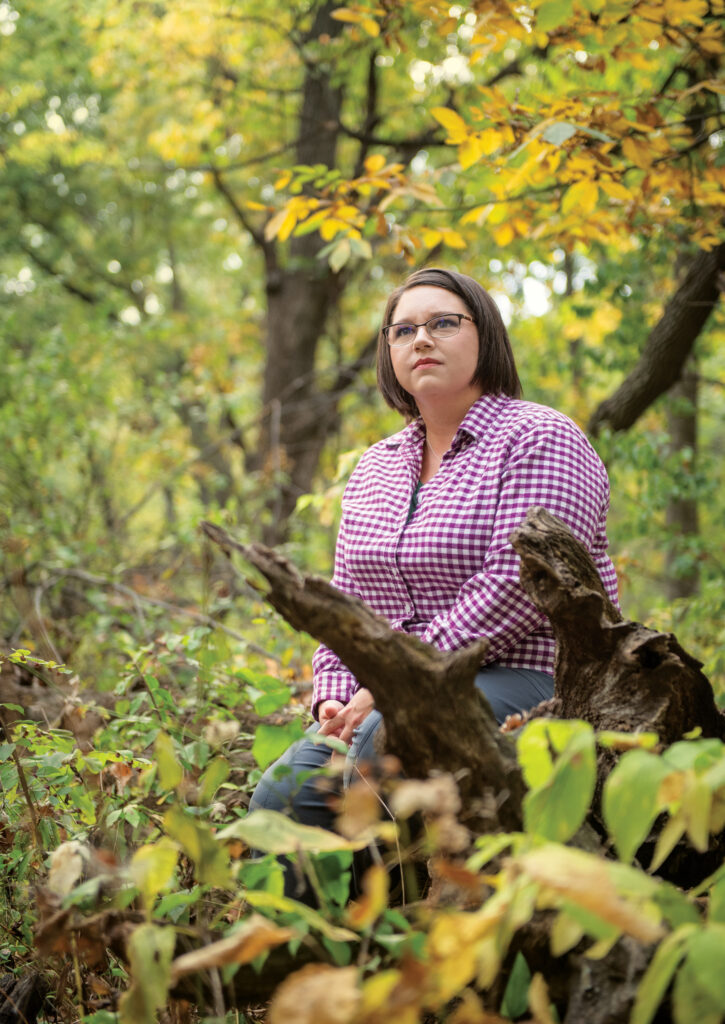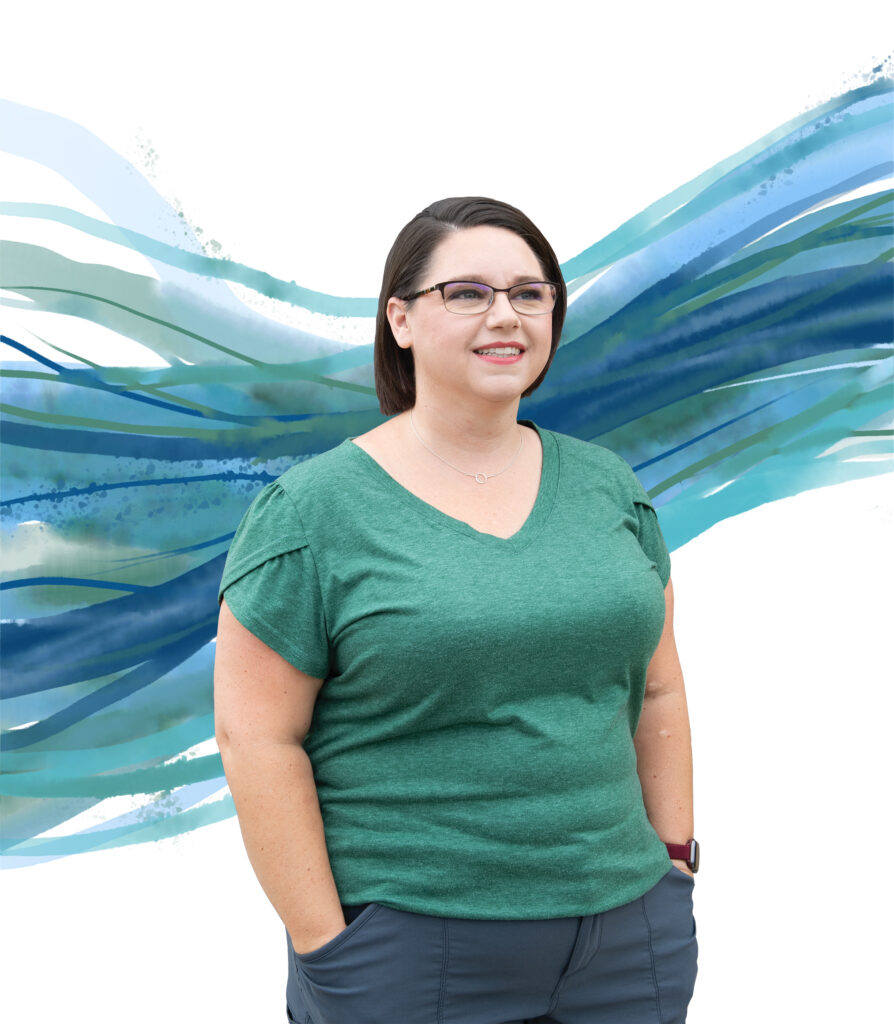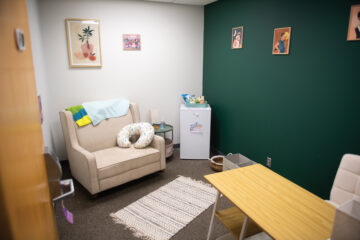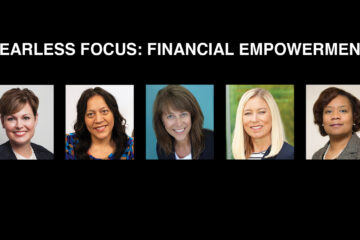
As told to Emily Barske Wood
Christen Bain is a nontraditional student, studying water resources engineering at Iowa State University – her second undergraduate experience. With an undergraduate degree in international relations and a master’s in public administration from Drake University, she worked in higher education and marketing. For years she considered making a career pivot. In 2021, at 35 years old, she officially made the leap, going back to school to focus on her passion for water quality. The admissions process involved advocating for herself to show some of the classes she’d done at Drake more than a decade earlier should meet her current degree requirements. She expects to graduate from ISU in the spring of 2025. One of her long-term goals is to work with younger women to promote careers in STEM.
The following story has been formatted to be entirely in her words, and has been edited and condensed for clarity.
My mom was a research chemist, so she traveled a lot. She developed new formulations and would then go oversee them being implemented into production. So I kind of saw a career as a chemist as a traveling position – which is really funny. Most chemists aren’t traveling all the time, right? But that’s what I saw, so that’s what I thought.
I had a really great experience in high school science. My biology teacher was a woman. My chemistry teacher was a woman. It’s not that a science career wasn’t a possibility, I just had in my mind that it required a lot more education than I was willing to sign up for at that point in my life.
I was really into foreign languages. I started studying French in seventh grade and then got connected to the Concordia Language Villages. Learning French, doing that immersion experience for a couple of weeks each summer, I decided, OK, I love it and I’m going to do something in college to do with French. I looked all over the country at different schools that had foreign language programs and who was doing the most innovative thing, and at the time, it was Drake. Senior year I remember thinking, well, maybe I’m gonna go do a translation interpretation grad degree, and I’ll be a professional French interpreter.
There’s a lot of questionable choices that I made as an 18-year-old that I look back now and think, why on earth did you say a science career wasn’t possible, but you thought that speaking French was a career that was possible?
I graduated from Drake at the start of the 2008 recession, so there were no jobs anywhere. So I got a job on Drake’s campus. It was a little bit of admissions and program management. Finding, recruiting, hiring the native speakers that we had to teach the students, and then working with all of the different faculty members. They had faculty members on campus that taught some of the languages, but then we also hired out folks all across the country and world to teach other languages. The job was fantastic because I was able to interact with these people that were all over the world. It was international relations, it was politics, it was international economics. It was also multicultural understanding and interpersonal relationships that span cultures. I got a master’s in public administration along the way because Drake offered graduate degrees to employees for free. So I was really thriving in that role, but the job was not paying very much at all.
I found a new job at Simpson College, where I was going to be working with the business and the journalism departments in a brand-new position. The role was a little bit admissions, a little bit marketing. That was another really great experience – I loved working on a college campus. And then Simpson had a big round of layoffs and laid off a bunch of staff, and that last-in, first-out thing happened, and I was part of that round.
When I started looking around, the Dentons Davis Brown Law Firm came up. They do a lot of immigration law work. That was something that I had seen from my experience volunteering with the Spanish-speaking community and working with French-speaking refugees. I didn’t know anything about law firms, but I knew that this was a law firm that had a little bit to do on the international side. So it seems like it would be a good fit, and I worked there the next six years through 2021.
I previously had some conversations with an adviser at Iowa State in 2017 about going back to school, and maybe I wanted to study engineering because I wasn’t happy with what I was doing. I have always been a super go-getter. So honestly, I might have just thought, what’s the hardest thing that I could do right now? Engineering? Let’s go. At the point where they said, “We need your high school transcripts,” I said, “Nah, I’m not interested in doing that amount of work.” I thought, this isn’t actually what I want to do. I’m not truly focused. I’m going to stick with what I’m doing.
But then came the summer of 2020. I think a lot of folks in the pandemic were sitting at home and wondering, what am I doing with my life? I decided that doing marketing for a law firm was not what I wanted to be doing. So if I don’t want to do marketing at a law firm, where do I want to do marketing at? And do I want to do marketing anywhere? I’m gonna take one step back.
I worked with a career coach who had me look at so many job descriptions on Indeed. She said to see what in those job descriptions speaks to you. We did all of those personality assessments to look at: What do I enjoy about my job? What do I dislike about my job? What would I want to bring with me? What are the personal things that I get excited about? What I found was: I like when I can be a problem solver. When I can take a problem and say, “I am going to work this from start to finish.” I like a little technical work. Also, I’m really passionate about water quality. I landed on water resources engineering. The career coach encouraged me to talk to a lot of engineers, and so I did.

I talked with family, friends – family of friends – to ask, “What are your experiences being an engineer?” There’s still that idea that there aren’t that many female engineers. So what is life actually like as a woman in an engineering consulting firm in particular? Having those conversations it seemed like, yeah, this is something that seems like I can do. I can have that problem-solving approach, and the collaboration that I enjoy, and also work on water quality issues. So that’s when I restarted those conversations at Iowa State and said, “OK, I’m serious about this this time. Let’s actually make this happen.”
From a financial perspective, to say I’m no longer going to be making money and instead I’m going to be spending $16,000 a year on tuition – that’s huge. I actually thought that there would be a lot more scholarships available – I’m a nontraditional queer woman in STEM. I thought, shouldn’t there be some scholarships for me for this? Turns out there’s not as many as I thought there would be. So supporting this was a joint decision for my wife and me. You’ve got to say, “Do we have the money to support this family on one income versus two?” When we had bought our house, we had purposefully made the choice at that time that we wanted to buy a house that would have costs that we could support on one income. At the time we bought the house in 2014, we were not saying one of us is gonna go back to school, but just from a very financially conservative perspective, we wanted to be able to afford the house if anything happens.
Also from the time perspective, I figure it takes an hour and 15 minutes for me to get from my door to whatever class I’m going to. I look at those hours and think, I could be studying during those three hours a day, or I could be helping out around the house. So in addition to all of the time that’s spent actually in the classroom and studying, there’s that commute time that is also pretty difficult. So my partner and I had a big discussion when I made my decision to go back to school.
It does go back, though, when my partner graduated in 2009, she started working at a really soul-sucking, terrible job that you could find during the recession. Then she decided that she wanted to go back to school and study computer programming. So while I was working at Drake she also went to school at Drake and got a computer science degree. It was completely free. Gay marriage wasn’t legal, so she was my domestic partner, but Drake was progressive enough at the time to be able to offer that tuition benefit to her. So we had that experience. It wasn’t four years for her, but she was back in school and I was the full-time earner at that point. We do have this history of supporting each other as we’re continuing our education, pursuing our passions.
At Iowa State, I’m in the Department of Agricultural and Biosystems Engineering, which is a relatively smaller department on campus. The adviser I have is really hands-on and she has been really helpful at helping me navigate the university’s systems. She has really smoothed the way for me. But some parts of higher education institutions are not set up for nontraditional students at all. Like filling out certain forms that request a parent’s signature – that’s not going to happen for me. FAFSA, for financial aid, they assume that you have these parents that you need to get their signature and tax forms. I haven’t been on my parents’ taxes for 20 years. There haven’t been significant barriers. I would say it’s mostly just me kind of chuckling and finding the way around it.
The other really funny thing was that they sent a letter to “the family of Christen Bain.” So I made my wife open it because she’s “the family.” It was about how to be safe on campus. I was like, this is clearly geared toward the traditional 18-year-old student who’s going from high school to college.
I live on the south side of Des Moines, so I was not excited about driving up to Ames every day. So the classes that I could take at DMACC, I did. It was nerve-wracking. I don’t think that I look particularly old, but I knew that I was the old lady compared to the 17-, 18-year-olds that were also taking the class at DMACC that fall. DMACC is also a completely different story because there are a lot of nontraditional students and they’re welcome to that experience. That took the anxiety away because I was able to show up and not be so different from everyone else in the classroom.
I was bouncing around between the downtown DMACC campus and then also up in Ames. My class at Iowa State in the fall of 2021 was a lecture of 150 students, but then we broke out into small groups of four or five students. That was awkward because they were all traditional college students, brand new to campus, brand new to college life and I was only on campus one day a week to go to this one class. A lot of those students in the cohort are all taking the same classes, so I know those students a lot better now and we’ve been in small group projects together. But in the very beginning it was awkward, to be the interloper who’s keeping tabs on all the youngins, was the kind of feeling that I had about it.
I did the mix of DMACC and ISU classes for a year, and in working with the adviser up at Iowa State, it became clear that the right thing was to go ahead and start sophomore year full time in Ames.
When I fully started full time on campus last fall, in a 400-person lecture you kind of blend in. Nobody cares who you are. Even in my differential equations class, which was about 20 people, it was just, “Let’s get through this together.”

I purposefully fill my social media feed with women. I listen to podcasts from women. I am very intentional about making sure the media I consume is very female-focused. I think if I were the average person searching YouTube for “my life as a water resources engineer” it’s probably a lot more male heavy, but I just purposefully sought out the alternative. In my department, you have a lot of folks in the power machinery focus, so that’s a lot of folks that are interested in going to work either back on the farm or to work in farming from an engineering perspective, and there’s a few domains that are the environmentalist side. I think one of the good things my program does is that we are mixing amongst each other and learning from each other. It is pretty gendered, though, with the vast majority being men in the power-machinery cohort, at least in my class.
There have been a couple instances where I’m talking with male engineers, who have been particularly out in manufacturing for a long time, not so much on the consulting side, who just kind of have this assumption that engineers are men. And that really rubs me the wrong way. There’s one professor who uses “this guy” in all his examples. He’ll preface a class, “When I say ‘a guy’ and ‘that guy,’ I just mean ‘a person.’” OK, fine. But then the only woman who’s mentioned in his fictional examples is the secretary or the person in the accounting office, that’s when I’m like, OK, when you say “that guy” you actually mean “that dude.” Because all of the engineers and all of the technicians are guys, and the one woman in that story is the secretary. We have a few classes with everyone in the department who is on track to graduate in 2025 and we’re probably just under half women. So I know the future holds a lot more women in engineering.
As a nontraditional student it’s really hard to be involved in extracurriculars because they meet at like 9 p.m. – and I’m in bed at 9 p.m., and I don’t live in Ames. There are also night exams for the huge classes. Like Calc 1, it doesn’t matter when your section meets, all of the students in Calc 1 are going to take the test at the exact same time. When that exam starts at 6 p.m., that’s doable. When that exam starts at 8:45 p.m. and you have an hour-and-15-minute drive after that – my mind is not doing math at 8:45 p.m. Thankfully my professor last semester was really great and she let me take the exam in the morning. But that’s one of the things that is not set up for nontraditional students at all: those of us who left 9 p.m. coursework a long time ago.
If I wasn’t married, would I transition myself to more of the student schedule? Maybe. Because sometimes the small groups want to meet at 8 p.m. At this point, I’ll say, “If we can meet on Teams at 8, I’m happy to log in and meet with you guys. I’ll just be at home and not on campus. But if you guys want to meet at 10 p.m., that’s just not possible.” There’s plenty of people that work alternative schedules as full-fledged adults, but I want to stay on a schedule where I am waking up and having breakfast with my wife and doing the daily chores that we need to do together.
I have a carpool buddy. Through the state of Iowa’s carpool website, I found another student, who is a traditional college student, but he’s living in Des Moines. Depending on what our schedules are for the semester and any particular week, we might carpool together two to four times a week. That has been really great to have him because he gives me insight into the life of a traditional college student. When I see students doing weird things – these are the questions I take to him and say I need him to explain this. He’s become a really good friend.
I just completed my summer internship with ISG. I don’t want to denigrate any young intern, but at 19, 20 years old, my ability to interact with other professional human beings was a lot different than it is now. I can relate a lot better to colleagues – I’m a homeowner and have three cats in the house, and I’m not a parent myself, but all my close friends are. So even though I’m not talking about putting my kid to sleep last night, I did go to the new splash pad with my little niece and nephew. Those sorts of things that are just easier to relate to when you’re closer in age. I’m also not scared to ask questions and speak up like I was when I was 20.
But there’s also the weird side of it. I had people on my last day say, “Wow, Christen, I really forgot you were an intern and you were gonna leave.” I said, “I am an intern, and I am going back to school next week.” It’s weird to be one of the older people in the room but without the knowledge that somebody of my age “should” have.
The internship was so instructive. Iowa State does a really good job of having some low-credit hour courses that expose you to at least a little bit of practical exposure. Because otherwise you’d get to your junior year and wonder, what does an engineer do? Because all I know is math and science. But the internship took that and exponentially expanded that.
I set a goal for myself to have at least one networking meeting every month, whether that’s an engineer or someone who’s associated with an engineer’s work. That’s something that continues to sustain me through this log of theoretical coursework. I can’t do one more differential equation – but then I show up for coffee with someone who works for the county who does water resources work. It’s like, OK, this is why I’m here. This homework is so I can do that thing that this person is doing that’s really cool.
Whether you’re going back to school to study engineering or any other goal that takes awhile to achieve, having that time to recenter and refocus on the goal has been really vital to my ability to continue to push through.
What does it mean to be fearless?
I don’t see “fearless” in an absolute positive light if you think about it as someone who literally has no fears. I think what I’m doing is acknowledging the fear of uncertainty, of financial difficulty, of struggle in school. I’ve acknowledged that it’s there and I’m going to keep going.

